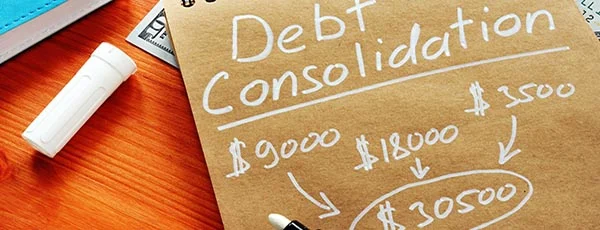Is Debt Consolidation a Good Idea?

- Debt consolidation combines multiple existing debts into one new debt.
- Debt consolidation could simplify repayment, reduce your interest rate, and often lower your monthly payments.
- Debt consolidation is one solution to managing a substantial amount of debt. Other options include debt settlement and a debt management plan.
Table of Contents
If you feel overwhelmed and in need of debt relief, consolidating your debt is one possible solution. Taking this step shows courage—you’re already moving toward taking back control and finding a clearer, more manageable path forward.
Debt consolidation involves taking out a new loan and using it to pay off multiple debts you already have. For example, if you owe money on three credit cards, you could apply for a debt consolidation personal loan large enough to pay off all three.
Consolidating debt could make it easier to repay what you owe because:
You'll have one monthly payment instead of more than one
You may be able to lower your payments to get some relief in your monthly budget
A consolidation loan should have a lower rate than what you're paying. That could help you save on interest charges.
For all these reasons, consolidating debt can be a good idea—if you approach it the right way.
Pros and Cons of Debt Consolidation
Debt consolidation means getting one new loan to pay off multiple debts. Debt consolidation doesn't reduce the total balance you owe, but it could accomplish other important goals.
Still, even useful financial solutions don't apply to all situations. Whether debt consolidation is the right move for you depends on the circumstances. These include things like the type of debt you have, your credit record, and your ability to make payments.
Understanding the pros and cons of debt consolidation will help you decide whether it's a good solution for you.
Potential benefits of debt consolidation
Here are some of the benefits you might enjoy if you consolidate your debt:
Fewer payments. It can be tough to keep track of multiple payments with different due dates. Consolidating some of those debts into a single payment makes handling your monthly bills easier.
Lower monthly payments. Debt consolidation could lower your monthly payments. You can do this by choosing a debt consolidation loan with a longer repayment period and/or a lower interest rate.
Lower interest expenses. Replacing high-interest debt with a low-interest loan could cut your total financing costs.
Improved credit score. Debt consolidation offers short- and long-term benefits for your credit score. It could improve your credit utilization ratio, help you get rid of your debt faster, or help you avoid late payments caused by juggling multiple bills.
Potential drawbacks of debt consolidation
When you consider debt consolidation, think about some of the potential pitfalls, such as:
Fees. You may encounter several fees when consolidating debt, including application or initiation fees for loans and balance transfer fees for credit cards. Fees don't have to be a deal-breaker. Just be aware that they could reduce the financial benefit you'd get from debt consolidation. Account for any fees before you commit to a consolidation by subtracting the cost of fees from any financial benefit you might get, such as lower interest charges. Then you can decide whether consolidation is still a cost-effective approach.
Credit requirements. Debt consolidation generally requires qualifying for new credit, such as a loan or a balance transfer card. If your credit score has been damaged, it may lessen your ability to qualify or to get a favorable interest rate.
There isn't always an interest rate advantage. Getting an interest rate advantage from consolidation depends on the type of debt you have now and current rate conditions. It also depends on your credit record. Compare the terms you'd be able to get with the cost of each of your current debts.
Risk of accumulating more debt. Once you clear the balances on your credit cards, resist the temptation to build those balances back up again. Debt consolidation should be part of a broader budgeting and debt reduction strategy. Otherwise, you'd just be adding to your potential for taking on debt.
These pros and cons probably won't apply equally to all your debts. So, look at each debt separately. You may find it makes sense to consolidate some debts while leaving others as they are.
Even if it makes sense to consolidate just some of your debts, it may be well worth it. You may find that reducing payments and saving money on some of your debts gives you the breathing space in your budget to handle all your debts more easily.
When Is Debt Consolidation a Good Idea?
Debt consolidation is a good idea in several situations. Here are some examples of when consolidating your debt may be right for you.
You have high-interest debt, such as credit card debt
Consolidation creates an opportunity to reduce the interest you're paying if you can qualify for a loan at a lower rate. That could be especially useful if you’re paying down credit card debt.
Example: You have three credit card balances, all with interest rates close to 30%. If you have fair or good credit, you might be able to qualify for a personal loan with a rate considerably lower than that.
You’re making high monthly payments
If you’re having trouble affording your bills, consolidating could provide relief. A lender could lower your rate and/or allow you to pay off your loan over a longer time.
Example: Suppose you have a $10,000 loan balance at 10% that you're scheduled to pay off over the next three years. This requires a monthly payment of over $300. With your other financial obligations, you're finding this hard to afford.
If you consolidate that into a five-year loan at a similar rate, it could shave $100 off of your monthly payments. A longer payoff time means you’d pay more interest in the long run. If you can also consolidate some high-interest credit card debt into the same loan, the interest savings on those debts could offset some of the additional interest you’ll pay as the result of taking longer to pay off the loan. Meanwhile, your monthly payments could become more affordable.
It’s hard to keep track of several monthly payments
When you consolidate multiple debts and end up with just one payment to make, it's much easier to keep track of.
Example: Let’s say you have four credit card balances and two loan payments, all with different due dates each month. Instead of keeping track of six different payment deadlines, imagine how much easier it would be if you had just one payment from the consolidation loan.
You can qualify for an affordable consolidation loan
Usually, you'll need at least a fair or good credit score or a cosigner to get an affordable consolidation loan.
Example: As of mid-2025, the average interest rate charged on credit cards was over 22%. At the same time, the average rate on personal loans was 11.57%. If your credit is good enough, consolidating your credit card balances into that loan could save you over 10% a year in interest.
You’ve made a commitment to rein in spending
Debt consolidation works best when it’s part of a broader program to follow a budget and pay off debt.
Example: Suppose you have $500 a month in debt payments. With your other expenses, you're having trouble making ends meet. Consolidating debt would shave $100 off those monthly payments.
By setting a budget, you find a way to reduce monthly spending by $50. In total, you've now reduced monthly expenses by $150. That could make enough of a difference for you to get ahead each month instead of going further into debt.
When Should You Think Twice About Debt Consolidation?
Despite its many benefits, debt consolidation isn't the best option for everyone. Here are some signs that you may want to explore other options for debt relief.
Your spending isn't under your control yet. Debt consolidation works best when you stop spending after you consolidate your debts and free up room on your credit cards.
You wouldn't be able to afford your payments even after debt consolidation. Make a detailed budget and plan ahead to decide if debt consolidation would make your monthly payments affordable. If not, you'll need to consider other options.
You won't lower your interest rate. Reducing your rate is one of the biggest benefits of consolidation. If your rate stayed the same or would be even higher, consolidation loses this advantage.
Your credit would make qualifying for a consolidation loan challenging. If you've missed payments or have other black marks on your credit record, you may not qualify for an affordable consolidation loan. In that case, you should think about improving your credit before you borrow.
Alternatives to Debt Consolidation
Debt consolidation isn't the only way to tackle debt. Here are some other solutions that have helped many people to get rid of debt and build a brighter future.
Payment strategies: Debt avalanche or snowball
Instead of consolidating your debts, you may find ways to pay them more efficiently.
For example, a DIY debt avalanche strategy focuses on your highest-cost debt first. You direct any extra money toward that high-cost debt while you continue making the minimum payments on your other balances. This way, you could save money on interest payments more quickly. That means more of your future payments will go toward debt reduction instead of interest.
Your payments would steadily gather force like an avalanche. This could help you pay off your debt more quickly and cheaply.
If you're more interested in simplifying your payments than reducing cost and want a hit of motivation, you could consider the debt snowball approach. This strategy has you direct any extra cash toward your smallest debt first while you pay the minimum on your other balances. That's the fastest way to start eliminating individual balances, and wiping out a smaller balance gives a motivational hit. The snowball method, when it gets going, means fewer monthly payments to deal with.
Balance transfer credit card
A balance transfer credit card can be used to consolidate debt, but it could also be used to refinance an individual debt.
This might be a good solution if you've leaned heavily on one credit card and you have only one high-interest debt to worry about. In that case, your goal isn't to simplify your payments, but to reduce the cost of your debt.
A balance transfer credit card could give you a temporary break from paying interest. Your payments would go entirely toward paying down the balance. You could use that break to pay down the balance.
A key to this strategy is to reset your budget so you don't build credit card debt back up again.
Debt settlement
If you can’t afford to fully repay your debts, you may need to look into other options for debt relief, including debt settlement.
Debt settlement means your creditors agree to accept less than the total amount you owe, then forgive the rest.
When you settle your debt, you (or the debt relief company helping you) will negotiate with creditors. The goal is to get them to accept payment for less than the full balance due. Often they'll do this if they don't think they'll get paid otherwise.
To save up money to offer creditors, most people in a debt settlement program choose to stop making their debt payments. This lets you build up funds, and it also sends a clear financial distress signal to your creditors. It is likely, however, to damage your credit.
Forgiven debt is usually reported to credit bureaus as settled instead of fully paid. You also may owe taxes on the forgiven amounts unless you're insolvent (your debts exceed your assets).
In the end, you might be able to substantially reduce what you owe, which makes debt payoff much more affordable. You could start rebuilding your credit immediately once the debt has been resolved.
Debt settlement is an option to consider if your credit isn't good enough to qualify for a debt consolidation loan or a balance transfer card. It also might be necessary if you wouldn't be able to afford the payments even after consolidating your debts.
Debt management plan (DMP)
Debt management plans allow you to make one payment instead of several different ones to creditors.
When you enter into a DMP, you work with a credit card counseling professional who enrolls your credit card accounts into the plan and contacts each creditor to negotiate better terms. This could include waiving late fees or lowering interest rates.
As part of participating in a debt management plan, you make a single payment, and the money is distributed to your creditors. You usually have to close your credit cards so you can’t run up additional debt while paying off what you already owe.
A DMP could help make debt more affordable, but you usually won't get a reduction in your balance. The monthly payment can be very high because it’s designed to clear your unsecured debts in three to five years. You can help make your DMP a success by finding the right credit counselor and by committing to avoiding new debt.
How to Consolidate Debt
The success of debt consolidation depends on getting the right kind of debt consolidation loan. The good news is, you have many options for loan types, including the following:
Home equity loan. Home equity loans offer some of the lowest interest rates available. Repayment terms last as long as 30 years—a plus if your main goal is lowering your payments. The downside is that home equity loans are secured loans. Your home is the collateral. If for any reason you fail to repay the loan, you could lose your home.
Zero-interest credit card. Balance transfer cards allow you to pay 0% on a transferred balance for a limited time. You’ll typically pay a 3% to 5% fee for each balance that you transfer over to the new card. Balance transfers could work for someone who is prepared to fully pay off the debt during the low-interest promotional period. After that, any remaining balance jumps to the card’s regular APR, typically high. A common pitfall with balance transfers is running the balances back up on the paid-off credit cards after you transfer the balances. This could leave you more deeply in credit card debt.
Personal loan. Personal loans generally carry higher interest rates than home equity loans, but the rates are lower than credit cards. This could be a good option if you don’t have equity in a home, or if you’ll need more time to pay off your debt than a balance transfer card would give you.
Your situation is likely to determine the right kind of debt consolidation loan for you. In any case, consider whether the terms you’re able to get will work before you borrow.
Common Mistakes to Avoid When Consolidating Debt
The potential benefits of debt consolidation are sometimes undermined by the following mistakes:
Not addressing underlying spending habits. If you built up debt because your spending exceeds your income, then consolidation is only going to be a temporary fix. Consolidation can help you handle existing debts. Only tighter budgeting will help you avoid new ones.
Taking on new debt while paying off consolidation loans. The danger is that you'll just run your credit card balances back up once you clear them with a consolidation loan. Consolidation needs to be part of a broader budgeting and debt reduction strategy.
Not looking at the total cost. Consolidation could help reduce your monthly payments, but that's just one thing to look at. Fees to initiate loans or transfer balances might eat up some or all of your savings. Also, if you extend repayment over a longer time, be sure to look at how this affects your total interest cost.
Failing to budget for payments. Even if a consolidation loan looks like it might help, never borrow without a specific plan for how you'll make the payments. If you're in too far over your head, you may have to consider other approaches, like debt settlement.
Not consolidating the right debts. Even when consolidation is the right approach for some of your debts, it may not be a cure-all. You might not be able to save money by consolidating low-interest debt. Also be aware of the risk when you use secured debt to pay off unsecured debts.
Debt consolidation has the potential to be very effective in some situations. Recognizing these potential mistakes will help you take the steps to make consolidation work for you.
How to Choose Between Debt Consolidation Options
It's nice to have multiple debt consolidation options, but how do you choose?
Consider each option in the context of your situation. This includes your financial resources, credit score and the type of debt.
How different solutions fit with your situation will vary according to the characteristics of each debt consolidation option.
Home equity loan
These loans may be a good fit if you:
Have a substantial amount of equity in your home
Have debts with medium-to-high interest rates
Need an extended repayment period
Have at least fair-to-good credit
Are very confident you can make the loan payments
These loans may not be a good fit if you:
Don't have sufficient equity in a home
Have very poor credit
Aren't sure if the payments will fit your budget
Balance transfer credit cards
These may be a good fit if you:
Don't have great credit. Most balance transfer cards require good credit, but some are available to people with no or low credit scores
Are confident you can pay off balances within the 0% introductory period—typically 12 to 18 months
Have a substantial amount of credit card debt
Have a budget plan to prevent building credit card balances back up once they're paid off with the balance transfer card
Could save money even after accounting for balance transfer fees
These may not be a good fit if you:
Have loan debt rather than credit card debt
Don't expect to be able to pay off the balance with in the introductory period
Have credit that’s too poor to qualify for a balance transfer card
Don't have a budget plan for making payments and meeting expenses without continued borrowing
Find the balance transfer fees are too high to make consolidation worthwhile
Personal loans
These may be a good fit if you have:
A lot of high-interest debt, like credit card debt
Credit thats’s good enough to qualify for a loan with rates lower than your current debt
A budget plan for making the payments and not building credit card balances back up
These may not be a good fit if:
Your credit is poor. Even if you can qualify for a loan, it might be at rates that are too high to save you much money
Your debt is in loans with low to medium rates. It might be hard to do better with at personal loan
Loan fees wipe out any advantage you'd gain from consolidation
You can't afford the payments, even after consolidation
Compare the options to find out which best fits your situation. You may decide that one or more of these options fits some of your debt, but not all of it. Keep in mind that you can also consider non-consolidation alternatives such as a debt management plan, debt settlement and payment strategies like the debt avalanche or snowball.
Whichever you choose, it should be part of a long-term plan to get your finances in better shape. Getting control of your budget could help you pay off debt faster and stay clear of debt once you do.
Not only will your budget benefit, but you'll gain peace of mind from feeling more in control.
Insights into debt relief demographics
We looked at a sample of data from Freedom Debt Relief of people seeking debt relief during January 2026. The data provides insights about key characteristics of debt relief seekers.
FICO scores and enrolled debt
Curious about the credit scores of those in debt relief? In January 2026, the average FICO score for people enrolling in a debt settlement program was 593, with an average enrolled debt of $25,843. For different age groups, the FICO scores varied. For instance, those aged 51-65 had an average FICO score of 588 and an enrolled debt of $27,829. The 18-25 age group had an average FICO score of 556 and an enrolled debt of $17,051. No matter your age or debt level, it's reassuring to know you're not alone. Taking the step to seek help can lead you towards a brighter financial future.
Home-secured debt – average debt by selected states
According to the 2023 Federal Reserve Survey of Consumer Finances (SCF) (using 2022 data) the average home-secured debt for those with a balance was $212,498. The percentage of families with mortgage debt was 42%.
In January 2026, 25% of the debt relief seekers had a mortgage. The average mortgage debt was $236504, and the average monthly payment was $1882.
Here is a quick look at the top five states by average mortgage balance.
| State | % with a mortgage balance | Average mortgage balance | Average monthly payment | |
|---|---|---|---|---|
| California | 20 | $391,113 | $2,710 | |
| District of Columbia | 17 | $339,911 | $2,330 | |
| Utah | 31 | $316,936 | $2,094 | |
| Nevada | 25 | $306,258 | $2,082 | |
| Massachusetts | 28 | $297,524 | $2,290 |
The statistics are based on all debt relief seekers with a mortgage loan balance over $0.
Housing is an important part of a household's expenses. Remember to consider all your debts when looking for a way to get debt relief.
Regain Financial Freedom
Seeking debt relief can be the first step toward financial freedom. Are you struggling with debt? Explore options for debt relief to regain control of your finances. It doesn't matter how old you are or what your FICO score or credit utilization is. Take the first step towards a brighter financial future today.
Show source
Author Information

Written by
Richard Barrington
Richard Barrington has over 20 years of experience in the investment management business and has been a financial writer for 15 years. Barrington has appeared on Fox Business News and NPR, and has been quoted by the Wall Street Journal, the New York Times, USA Today, CNBC and many other publications. Prior to beginning his investment career Barrington graduated magna cum laude from St. John Fisher College with a BA in Communications in 1983. In 1991, he earned the Chartered Financial Analyst (CFA) designation from the Association of Investment Management and Research (now the "CFA Institute").

Reviewed by
Kimberly Rotter
Kimberly Rotter is a financial counselor and consumer credit expert who helps people with average or low incomes discover how to create wealth and opportunities. She’s a veteran writer and editor who has spent more than 30 years creating thousands of hours of educational content in every possible format.
Is debt consolidation a good idea for student loan debt?
No. Government-backed student loans aren’t particularly good candidates for debt consolidation. Most already have low interest rates. And government-sponsored student loans offer borrowers special rights and advantages like forgiveness, in some cases, and income-based repayment programs. You’d lose those special features if you replaced this kind of loan with another form of debt. Private student loans may be better candidates for debt consolidation.
Should I close my credit card accounts after I pay off their balances?
Don’t be too quick to close accounts. Doing so could raise your credit utilization ratio, which is a negative factor in credit scores. Better to keep the accounts open, but with little or no balances.
Is debt consolidation a good idea even if I’m having no problem keeping up with my payments?
Absolutely. Debt consolidation isn’t just for people who are struggling with their debt. It can be a sound money-saving and organizing tactic for anyone with multiple debt balances. In particular, if you have high-interest debt like credit card debt, consolidation is worth a look.
Does debt consolidation hurt your credit?
No. In fact, done correctly, debt consolidation should help your credit in the long run. However, you should be prepared for possible setbacks to your credit score in the near term. Any time you apply for or open a new credit account, it can temporarily hurt your credit. And you have to be prepared to make your payments on the consolidation loan or else you could seriously damage your credit.
How long does debt consolidation take?
It should take just a few weeks to set up a consolidation program. However, that's just the start. Paying off the consolidation debt could take anywhere from a few months to several years. Part of your preparation should be to figure out a budget that tells you how long it will take.
What types of debt can be consolidated?
Potentially, just about any type of debt can be consolidated, but it's not always an advantage to consolidate some debts. For example, there may not be much money to save by consolidating low interest debts. Also, federal student loans have borrower protections that you may give up by consolidating into other types of debt.


